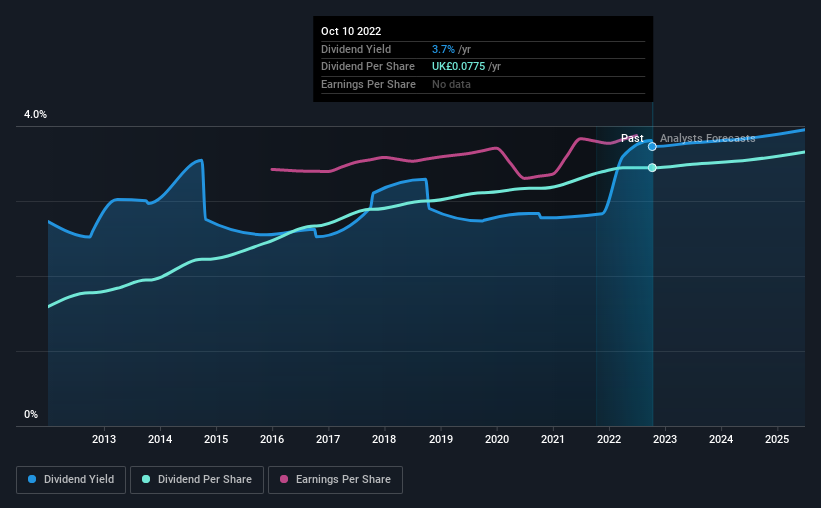The board of James Halstead plc (LON:JHD) has announced that it will pay a dividend of £0.055 per share on the 16th of December. The dividend yield is 3.7% based on this payment, which is a little bit low compared to the other companies in the industry.
Check out the opportunities and risks within the GB Building industry.
James Halstead's Payment Has Solid Earnings Coverage
While yield is important, another factor to consider about a company's dividend is whether the current payout levels are feasible. Before making this announcement, James Halstead was paying out quite a large proportion of both earnings and cash flow, with the dividend being 1,014% of cash flows. This is certainly a risk factor, as reduced cash flows could force the company to pay a lower dividend.
EPS is set to grow by 3.4% over the next year. If the dividend continues along recent trends, we estimate the payout ratio could reach 81%, which is on the higher side, but certainly still feasible.

James Halstead Has A Solid Track Record
The company has a sustained record of paying dividends with very little fluctuation. Since 2012, the annual payment back then was £0.0358, compared to the most recent full-year payment of £0.0775. This works out to be a compound annual growth rate (CAGR) of approximately 8.0% a year over that time. The growth of the dividend has been pretty reliable, so we think this can offer investors some nice additional income in their portfolio.
The Dividend's Growth Prospects Are Limited
Investors could be attracted to the stock based on the quality of its payment history. James Halstead hasn't seen much change in its earnings per share over the last five years. There are exceptions, but limited earnings growth and a high payout ratio can signal that a company has reached maturity. When a company prefers to pay out cash to its shareholders instead of reinvesting it, this can often say a lot about that company's dividend prospects.
James Halstead's Dividend Doesn't Look Sustainable
Overall, it's nice to see a consistent dividend payment, but we think that longer term, the current level of payment might be unsustainable. Although they have been consistent in the past, we think the payments are a little high to be sustained. Overall, we don't think this company has the makings of a good income stock.
It's important to note that companies having a consistent dividend policy will generate greater investor confidence than those having an erratic one. However, there are other things to consider for investors when analysing stock performance. Just as an example, we've come across 2 warning signs for James Halstead you should be aware of, and 1 of them doesn't sit too well with us. If you are a dividend investor, you might also want to look at our curated list of high yield dividend stocks.
New: Manage All Your Stock Portfolios in One Place
We've created the ultimate portfolio companion for stock investors, and it's free.
• Connect an unlimited number of Portfolios and see your total in one currency
• Be alerted to new Warning Signs or Risks via email or mobile
• Track the Fair Value of your stocks
Have feedback on this article? Concerned about the content? Get in touch with us directly. Alternatively, email editorial-team (at) simplywallst.com.
This article by Simply Wall St is general in nature. We provide commentary based on historical data and analyst forecasts only using an unbiased methodology and our articles are not intended to be financial advice. It does not constitute a recommendation to buy or sell any stock, and does not take account of your objectives, or your financial situation. We aim to bring you long-term focused analysis driven by fundamental data. Note that our analysis may not factor in the latest price-sensitive company announcements or qualitative material. Simply Wall St has no position in any stocks mentioned.
About AIM:JHD
James Halstead
Manufactures and supplies flooring products for commercial and domestic uses in the United Kingdom, rest of Europe, Scandinavia, Australasia, Asia, and internationally.
Flawless balance sheet established dividend payer.
Similar Companies
Market Insights
Community Narratives




